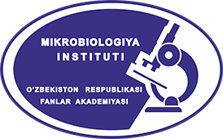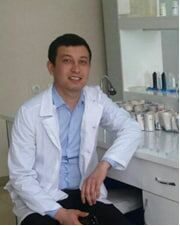Laboratory "Environmental Biotechnologies"
Since the establishment of the laboratory in 2020, fundamental and applied research has been conducted to study the contamination and salinity of various types of soils and water runoff in order to develop new technologies for their purification using microorganisms living in these soils and water, as well as in combination with physical methods.
The main scientific direction of the laboratory is:
-study of the level of soil and water pollution (heavy metals, oil products, pesticides, types of salinization)
- study of the spread of microorganisms inhabiting contaminated soils and water bodies (bacteria, fungi, actinomycetes, yeasts, etc.)
-identification of dominant and pollution-resistant species of microorganisms that have survived in contaminated soils and wastewater
- the study of the ability of pollution-resistant types of microorganisms - destructors of pesticides, phenolic compounds, oil products, and other pollutants
-development of biological methods for cleaning contaminated soils and water flows using isolated active microorganisms - destructors and biological products in combination with physical methods
Projects:
1. “Startup” project no. S –BSF-13 17.06.2019 “Organization of production of enzyme organic fertilizer series “Microzim” and widespread introduction in agriculture to increase yields and reduce the incidence of crops (2019-2021)..
2. Target application project A-FA-2021-123. "Introduction of new agricultural technologies using environmentally friendly preparations and their compositions to restore soil fertility, increase yields and reduce the incidence of plants and crops in disaster zones" (2021).
Scientific trips: Head of the laboratory Akhmedova Z.In February 2021, she went on a scientific trip to the Republic of Tajikistan to participate in the International Conference on Bio-Agriculture with a plenary report and to draw up a government agreement on the export and sale of the biologics product "Mirozim-2" for the preparation of organic cotton in Tajikistan.
In June 2023, she was on a scientific trip to the Republic of Kyrgyzstan to participate in the International Conference "Microbios–2023" with a plenary and sectional report.
Scientific developments of the laboratory:
Environmentally safe biological products of microbial origin were created to increase yields and reduce the incidence of wheat (“Microzim-1”) and cotton (“Microzim-2”), which were included in the list of approved drugs for widespread use in agriculture (certificate “Microzim-1", No. 1 A 367, No. C 2388, reg. No. 5.11.102, No. 5.11.274, certificate "Microsim-2" - No. 1 A 368, No. 1 C 2389, Reg. No. 5.11.103, No. 5.11.275).
Biologics have been widely used in various regions of the Republic and in the Republic of Karakalpakstan. The additional yield of wheat averaged 10-12 c /ha, the yield of cotton - 4-5.6 c / ha, the consumption of mineral fertilizers is reduced by 30-40%.
A bank of cultures of microorganisms with high destructive activity of pesticides and resistant in highly saline soils has been created. The dominant actinomycetes were isolated from the composition of the pesticide-clogged soils of the Mirzabad district of the Syrdarya region. Molecular genetic methods were used to identify the culture of Streptomyces rochei, strain N4, which was entered into the GenBank International Database for no: OQ918226 (gb-admin@ncbi.nlm.nih.gov)
A technology has been developed for cleaning polluted industrial and domestic water effluents using microorganisms, activated sludge in combination with EM pulses, leading to an intensification of the frequency of purification of reservoirs.
A technology for the preparation of organo-biomineral fertilizer using manure, plant waste from agriculture and hydrolytically active fungi and bacteria has been developed.
Using hydrolytically and antibiotically active fungi and actinomycetes, a method for preparing the biopesticide "Phytoshit" was created.
Carbohydrases of fungi, bacteria and yeast (Bacillus subtilus amylases 150 and 7A, inulases of the fungus Aspergillus oryzae, 5 strains of yeast Saccharomyces serevisiae) were studied. Various types of canned goods, juices, and puree from Heliantus tubers have been prepared, which has a therapeutic effect in the treatment of diabetes mellitus. Also, with the use of Heliantus inulin and yeast, a technology for the preparation of baker's yeast, fructose syrup has been created.
Doctor of Biological sciences, Professor
Senior researcher
Tonkix Anatoly Konstantinovich
Candidate of Biological sciences, Senior researcher
Senior Researcher
Doctor of Philosophy (PhD) in Biological sciences, Senior researcher




































